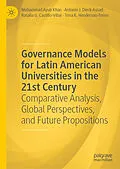This book explores new models and future possibilities of university governance in a Latin American context using management and leadership theories. The dramatic changes and uncertainty facing the world recently have forced us to reimagine the future of education. Changes such as digitalization, the increasing number of corporate universities, and the need for cost-effective educational programs and services require universities to keep evolving while ensuring that they maintain their essence as a critical social asset. This book offers a new approach to managing and leading the university, particularly by embracing the role and responsibility of delivering quality educational programs and services, by being innovative and flexible enough to make urgent decisions and act upon them in a timely and appropriate manner. With its contributions to management and the social sciences, this interdisciplinary book will serve as a valuable resource to researchers, administrators, and studentsalike.
Mohammad Ayub Khan is Director of the Management Department and Professor at the Universidad de Monterrey (UDEM), Mexico.
Antonio J. Dieck Assad is Consultant and Partner at Grupo Dieass Consulting and Former Rector at the Universidad de Monterrey (UDEM), Mexico.
Rosalia G. Castillo-Villar is Postdoctoral researcher at the Universidad de Monterrey (UDEM), Mexico.
Trina K. Henderson is Owner of Torres Henderson Education Resources, LLC, and Adjunct Professor of Business at the Universidad de Monterrey (UDEM), Mexico.
Autorentext
Mohammad Ayub Khan is Director of the Management Department and Professor at the Universidad de Monterrey (UDEM), Mexico.
Antonio J. Dieck Assad is Consultant and Partner at Grupo Dieass Consulting and Former Rector at the Universidad de Monterrey (UDEM), Mexico.
Rosalia G. Castillo-Villar is Postdoctoral researcher at the Universidad de Monterrey (UDEM), Mexico.
Trina K. Henderson is Owner of Torres Henderson Education Resources, LLC, and Adjunct Professor of Business at the Universidad de Monterrey (UDEM), Mexico.
Inhalt
Chapter 1 Transformation of the University Governance Philosophy and Operational System: An Exigency of the New Education Industry Order
Mohammad Ayub Khan
Chapter 2 University Management, Leadership, and Governance
Mohammad Ayub Khan
Chapter 3 The Industrial Effects: The Emergence of Corporate Universities
Mohammad Ayub Khan
Chapter 4 Contemporary Challenges to University Governance Models
Rosalia G. Castillo-Villar
Chapter 5 University Governance Models Across Regions: Europe
Eduardo Olier, Francisco Valderrey, and Emiliano García-Coso
Chapter 6 The Governance Models of Higher Education Institutions in the United Arab Emirates in the 21st Century
Ghassan Al-Qaimari
Chapter 7 University Governance Models Across Regions: Asia
Trina K. Henderson
Chapter 8 The United States, the Spirit of Democracy: Shared Governance Model
Trina K. Henderson
Chapter 9 University Governance System in the Latin American Context
Rosalia G. Castillo-Villar
Chapter 10 University governance in Mexico
Antonio Dieck Assad
Chapter 11 Corporate Governance in Peruvian Universities
Isabelle Velasquez Bellido
Chapter 12 Fostering Good Governance in Higher Education Institutions: The Case of Colombia
Henry Bradford, Alexander Guzmán, José Manuel Restrepo, and María-Andrea Trujillo
Chapter 13 Looking into the Future: The Education Institution Leadership
Rosalia G. Castillo-Villar
Chapter 14 The Future of Education and the Business School
Rosalia G. Castillo-Villar
Chapter 15 Pedagogy, Technology, Pandemics, and the University Governance
Agarzelim Alvarez-Milán
Chapter 16 The University Governance Model in the 21st Century: An Epilogue
Mohammad Ayub Khan, Antonio Dieck Assad, Rosalia G. Castillo-Villar, and Trina Henderson
